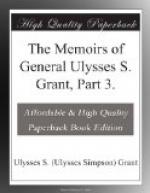Almost the first complaints made to me were these two outrages. The gentleman who made the complaints informed me first of his own high standing as a lawyer, a citizen and a Christian. He was a deacon in the church which had been defiled by the occupation of Union troops, and by a Union chaplain filling the pulpit. He did not use the word “defile,” but he expressed the idea very clearly. He asked that the church be restored to the former congregation. I told him that no order had been issued prohibiting the congregation attending the church. He said of course the congregation could not hear a Northern clergyman who differed so radically with them on questions of government. I told him the troops would continue to occupy that church for the present, and that they would not be called upon to hear disloyal sentiments proclaimed from the pulpit. This closed the argument on the first point.
Then came the second. The complainant said that he wanted the papers restored to him which had been surrendered to the provost-marshal under protest; he was a lawyer, and before the establishment of the “Confederate States Government” had been the attorney for a number of large business houses at the North; that “his government” had confiscated all debts due “alien enemies,” and appointed commissioners, or officers, to collect such debts and pay them over to the “government”: but in his case, owing to his high standing, he had been permitted to hold these claims for collection, the responsible officials knowing that he would account to the “government” for every dollar received. He said that his “government,” when it came in possession of all its territory, would hold him personally responsible for the claims he had surrendered to the provost-marshal. His impudence was so sublime that I was rather amused than indignant. I told him, however, that if he would remain in Memphis I did not believe the Confederate government would ever molest him. He left, no doubt, as much amazed at my assurance as I was at the brazenness of his request.
On the 11th of July General Halleck received telegraphic orders appointing him to the command of all the armies, with headquarters in Washington. His instructions pressed him to proceed to his new field of duty with as little delay as was consistent with the safety and interests of his previous command. I was next in rank, and he telegraphed me the same day to report at department headquarters at Corinth. I was not informed by the dispatch that my chief had been ordered to a different field and did not know whether to move my headquarters or not. I telegraphed asking if I was to take my staff with me, and received word in reply: “This place will be your headquarters. You can judge for yourself.” I left Memphis for my new field without delay, and reached Corinth on the 15th of the month. General Halleck remained until the 17th of July; but he was very uncommunicative, and gave me no information as to what I had been called to Corinth for.




